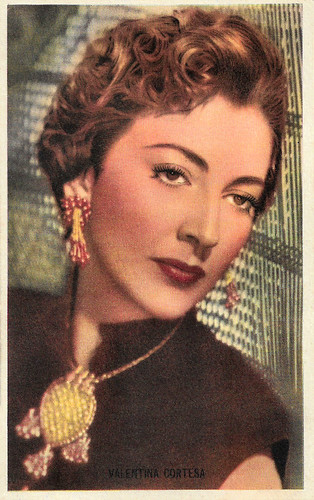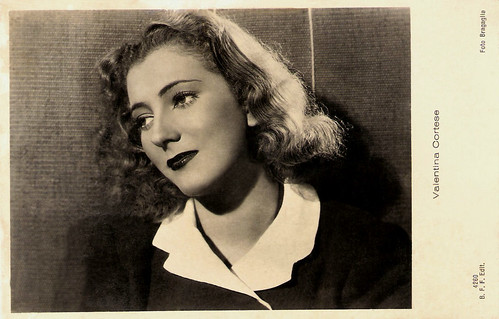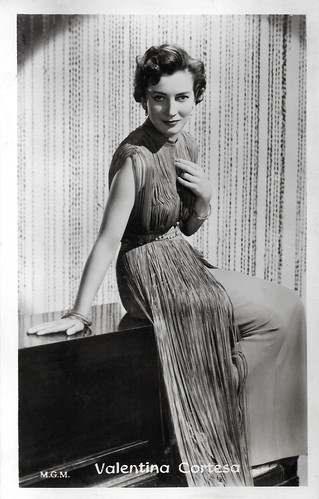Yesterday, Wednesday 10 July 2019, Italian film and stage actress Valentina Cortese (1923-2019) has passed away in Milan. She appeared in more than 100 Italian, French, British and American films and TV series. Cortese was nominated for the Oscar for Best Supporting Actress for her role in François Truffaut’s La nuit américaine/Day for Night (1973). She also worked with such titans of cinema as Michelangelo Antonioni and Federico Fellini. Valentina Cortese was 96.

Belgian collectors card by Kwatta, no. C. 243. Photo: MGM. Valentina Cortese in Malaya (Richard Thorpe, 1949).

Italian postcard by ASER, Roma, no. 48. Photo: Scalera Film.

Italian postcard by Casa Editr. Ballerini & Fratini (B.F.F. Edit.), Firenze, no. 4260. Photo: Bragaglia.

Italian postcard. B.F.F. (Ballerini & Fratini Firenze) Edizioni, no. 42290. Photo: Pesce / I.C.I.

Belgian collectors card. Photo: MGM. Spencer Tracy and Valentina Cortesa in Malaya (1949).
Valentina Cortese was born in Milan, Italy in 1923. As a young girl, she attended the acting school of Scalera Film.
She started her film career in 1940 and played small ingenue parts in such films as Orizzonte dipinto/Horizon painting (Guido Salvini, 1941), and L'Attore scomparso/The actor died (Luigi Zampa, 1941).
Valentina Cortese had the leading ingenue role in Primo Amore/First Love (Carmine Gallone, 1941). Marlene Pilaete: "It seems that it was a breakthrough for her. The 'First love' of the title was Valentina’s and she had to suffer a lot through this melodrama. She falls In love with a young musician, is deeply disappointed when she learns that he had a relationship with his former musical partner (Vivi Gioi), attempts suicide, gets gravely ill, and is cured by hearing a song composed by her beloved. How I would love to see that movie! Who could imagine such a screenplay today…"
The following year, Cortese played a supporting part in the Western Una signora dell'Ovest/Girl of the Golden West (Carl Koch, 1942) with Michel Simon. She soon became one of the most popular actresses of the fascist period.
Cortese appeared in several entertainment films of the 1940s, including La Cena delle beffe/The Joker’s Dinner (Alessandro Blasetti, 1942) starring Amedeo Nazzari, Quarta pagina/3/4 of a Page (Nicola Manzari, 1942) based on an original screenplay by Federico Fellini, Nessuno torna indietro/Responsibility Comes Back (Alessandro Blasetti, 1945), and Un Americano in vacanza/A Yank in Rome (Luigi Zampa, 1946).
A sensation was her double role as both Fantine and Cosette in I miserabili/Les Miserables (Riccardo Freda, 1948), a competent screen adaptation of the Victor Hugo classic.
The international success of the British-French melodrama The Glass Mountain (Henry Cass, 1949) brought her a Hollywood offer from 20th Century Fox. Studio mogul Darryl F. Zanuck emphasised her Mediterranean background by changing the spelling of her name to Cortesa.
She appeared as a sensual prostitute with a golden heart in Jules Dassin's Thieves' Highway (1949). Other American productions were Black Magic (Gregory Ratoff, 1949) with Orson Welles, and Malaya (Richard Thorpe, 1949) with Spencer Tracey and James Stewart.
She portrayed a girl pursued by a killer in the thriller The House on Telegraph Hill (1951, Robert Wise). Her co-star was Richard Basehart, whom she married that same year. She had one son with him before they divorced in 1960.
Cortese returned to Europe and worked with such great directors as Michelangelo Antonioni, who cast her in his Le amiche/The Girlfriends (1955) with Eleonora Rossi Drago, and Federico Fellini, who gave her a supporting part in his surrealist fantasy Giulietta degli spiriti/Juliet of the Spirits (1965) starring Giulietta Masina.
For her role in Le Amiche she won a Nastro d’argento (Silver Ribbon) for Best Supporting Actress. During these years she also appeared in such international films as The Barefoot Contessa (Joseph L. Mankiewicz, 1954) in which she played Countess Eleanora Torlato-Favrini, Magic Fire (William Dieterle, 1955), Barabba/Barabbas (Richard Fleischer, 1961) starring Anthony Quinn, and The Visit (Bernhard Wicki, 1964) with Ingrid Bergman.

Italian postcard by B.F.F. Edit. (Ballerini & Fratini Firenze Edizioni), no. 4306. Photo: Scalera Film / Foto Pesce.

Italian postcard by B.F.F. Edit. (Ballerini & Fratini Firenze Edizioni), no. 4311. Photo: E.N.I.C. / Foto Vaselli.

Italian postcard by Rizzoli, Milano, 1942. Photo: Pesce. Valentina Cortese as Lisabetta in La cena delle beffe/The Jester's Supper (Alessandro Blasetti, 1942).

British postcard in the Picturegoer Series, London, no. 785. Photo: 20th Century Fox. Cortese is named here Cortesa, the name often given to her in Hollywood. At Fox, Cortese did films such as Thieves' Highway (Jules Dassin, 1949).

Spanish postcard by Sobe, no. 638. Valentina Cortese and Richard Conte in Thieves' Highway (Jules Dassin, 1949).
Valentina Cortese did some of her finest work in her middle years. She gave a memorable performance as a fading, alcoholic film star, who can’t remember her lines, in François Truffaut's film-about-film La nuit américaine/Day for Night (1973).
She won several awards for this bravura role including the British Bafta award. In the US she was nominated for both a Golden Globe and an Oscar. When Ingrid Bergman won for her small role in Murder on the Orient Express (Sidney Lumet, 1976), Bergman apologised in her acceptance speech, saying that Cortese deserved the award more.
Other interesting performances by Cortese were the exalted mother in Le bateau sur l’herbe/The Boat on the Grass (Gérard Brach, 1971), and the wife of Leon Trotzky (Richard Burton) in The Assassination of Trotsky (Joseph Losey, 1973).
For director Franco Zeffirelli, she played the mother of St. Francis of Assisi in Fratello Sole, sorella luna/Brother Sun, Sister Moon (Franco Zeffirelli, 1972). Later followed several parts in the theatre for Zeffirelli and a role as Herodias in his TV Mini-Series Jesus of Nazareth (Franco Zeffirelli, 1977), an uncredited part in Il giovane Toscanini/Toscanini (Franco Zeffirelli, 1988) a biopic of legendary conductor Arturo Toscanini, and her final role as a mother superior in Storia di una capinera/Sparrow (Franco Zeffirelli, 1995) with Johnathon Schaech.
Her later films also included the adventure film When Time Ran Out... (James Goldstone, 1980) starring Paul Newman, Terry Gilliam's The Adventures of Baron Munchausen (1988), and the comedy Buster’s Bedroom (Rebecca Horn, 1991) with Geraldine Chaplin.
Valentina Cortese also had a fruitful stage career, working with directors like Giorgio Strehler and starring in plays like Friedrich Schiller's Mary Stuart and Frank Wedekind's Lulu. Her son, Jackie Basehart, also became an actor and appeared in several Italian films.

Vintage postcard. Photo: MGM. Cortese is presented as Cortesa, the name she was often given in Hollywood. Cortese wears a dress from the time of Malaya (Richard Thorpe, 1949), a film she did with James Stewart and Spencer Tracy.

French postcard by Editions P.I., Paris, no. 32. Photo: Metro-Goldwyn-Mayer, 1954.

West-German collectors card in the Flmstars der Welt series by Greiling-Sammelbilder, 2. Band, Serie E, Bild 99. Photo: 20th Century Fox.

Italian postcard by Bromofoto, Milano, no. 399.
Theatrical trailer Thieves' Highway (1949). Source: Diva Daniela 1 (YouTube).
Trailer for Giulietta degli spiriti/Juliet of the Spirits (1965). Source: Danios 12345 (YouTube).
Scene from La nuit américaine/Day for Night (1973). Source: The Bathroom Singer (YouTube).
Sources: Hal Erickson (AllMovie), Thanassis Agathos (IMDb), Trova Cinema (Italian), Wikipedia, and IMDb.

Belgian collectors card by Kwatta, no. C. 243. Photo: MGM. Valentina Cortese in Malaya (Richard Thorpe, 1949).

Italian postcard by ASER, Roma, no. 48. Photo: Scalera Film.

Italian postcard by Casa Editr. Ballerini & Fratini (B.F.F. Edit.), Firenze, no. 4260. Photo: Bragaglia.

Italian postcard. B.F.F. (Ballerini & Fratini Firenze) Edizioni, no. 42290. Photo: Pesce / I.C.I.

Belgian collectors card. Photo: MGM. Spencer Tracy and Valentina Cortesa in Malaya (1949).
Sensual Prostitute With A Golden Heart
Valentina Cortese was born in Milan, Italy in 1923. As a young girl, she attended the acting school of Scalera Film.
She started her film career in 1940 and played small ingenue parts in such films as Orizzonte dipinto/Horizon painting (Guido Salvini, 1941), and L'Attore scomparso/The actor died (Luigi Zampa, 1941).
Valentina Cortese had the leading ingenue role in Primo Amore/First Love (Carmine Gallone, 1941). Marlene Pilaete: "It seems that it was a breakthrough for her. The 'First love' of the title was Valentina’s and she had to suffer a lot through this melodrama. She falls In love with a young musician, is deeply disappointed when she learns that he had a relationship with his former musical partner (Vivi Gioi), attempts suicide, gets gravely ill, and is cured by hearing a song composed by her beloved. How I would love to see that movie! Who could imagine such a screenplay today…"
The following year, Cortese played a supporting part in the Western Una signora dell'Ovest/Girl of the Golden West (Carl Koch, 1942) with Michel Simon. She soon became one of the most popular actresses of the fascist period.
Cortese appeared in several entertainment films of the 1940s, including La Cena delle beffe/The Joker’s Dinner (Alessandro Blasetti, 1942) starring Amedeo Nazzari, Quarta pagina/3/4 of a Page (Nicola Manzari, 1942) based on an original screenplay by Federico Fellini, Nessuno torna indietro/Responsibility Comes Back (Alessandro Blasetti, 1945), and Un Americano in vacanza/A Yank in Rome (Luigi Zampa, 1946).
A sensation was her double role as both Fantine and Cosette in I miserabili/Les Miserables (Riccardo Freda, 1948), a competent screen adaptation of the Victor Hugo classic.
The international success of the British-French melodrama The Glass Mountain (Henry Cass, 1949) brought her a Hollywood offer from 20th Century Fox. Studio mogul Darryl F. Zanuck emphasised her Mediterranean background by changing the spelling of her name to Cortesa.
She appeared as a sensual prostitute with a golden heart in Jules Dassin's Thieves' Highway (1949). Other American productions were Black Magic (Gregory Ratoff, 1949) with Orson Welles, and Malaya (Richard Thorpe, 1949) with Spencer Tracey and James Stewart.
She portrayed a girl pursued by a killer in the thriller The House on Telegraph Hill (1951, Robert Wise). Her co-star was Richard Basehart, whom she married that same year. She had one son with him before they divorced in 1960.
Cortese returned to Europe and worked with such great directors as Michelangelo Antonioni, who cast her in his Le amiche/The Girlfriends (1955) with Eleonora Rossi Drago, and Federico Fellini, who gave her a supporting part in his surrealist fantasy Giulietta degli spiriti/Juliet of the Spirits (1965) starring Giulietta Masina.
For her role in Le Amiche she won a Nastro d’argento (Silver Ribbon) for Best Supporting Actress. During these years she also appeared in such international films as The Barefoot Contessa (Joseph L. Mankiewicz, 1954) in which she played Countess Eleanora Torlato-Favrini, Magic Fire (William Dieterle, 1955), Barabba/Barabbas (Richard Fleischer, 1961) starring Anthony Quinn, and The Visit (Bernhard Wicki, 1964) with Ingrid Bergman.

Italian postcard by B.F.F. Edit. (Ballerini & Fratini Firenze Edizioni), no. 4306. Photo: Scalera Film / Foto Pesce.

Italian postcard by B.F.F. Edit. (Ballerini & Fratini Firenze Edizioni), no. 4311. Photo: E.N.I.C. / Foto Vaselli.

Italian postcard by Rizzoli, Milano, 1942. Photo: Pesce. Valentina Cortese as Lisabetta in La cena delle beffe/The Jester's Supper (Alessandro Blasetti, 1942).

British postcard in the Picturegoer Series, London, no. 785. Photo: 20th Century Fox. Cortese is named here Cortesa, the name often given to her in Hollywood. At Fox, Cortese did films such as Thieves' Highway (Jules Dassin, 1949).

Spanish postcard by Sobe, no. 638. Valentina Cortese and Richard Conte in Thieves' Highway (Jules Dassin, 1949).
Fading, Alcoholic Film Star
Valentina Cortese did some of her finest work in her middle years. She gave a memorable performance as a fading, alcoholic film star, who can’t remember her lines, in François Truffaut's film-about-film La nuit américaine/Day for Night (1973).
She won several awards for this bravura role including the British Bafta award. In the US she was nominated for both a Golden Globe and an Oscar. When Ingrid Bergman won for her small role in Murder on the Orient Express (Sidney Lumet, 1976), Bergman apologised in her acceptance speech, saying that Cortese deserved the award more.
Other interesting performances by Cortese were the exalted mother in Le bateau sur l’herbe/The Boat on the Grass (Gérard Brach, 1971), and the wife of Leon Trotzky (Richard Burton) in The Assassination of Trotsky (Joseph Losey, 1973).
For director Franco Zeffirelli, she played the mother of St. Francis of Assisi in Fratello Sole, sorella luna/Brother Sun, Sister Moon (Franco Zeffirelli, 1972). Later followed several parts in the theatre for Zeffirelli and a role as Herodias in his TV Mini-Series Jesus of Nazareth (Franco Zeffirelli, 1977), an uncredited part in Il giovane Toscanini/Toscanini (Franco Zeffirelli, 1988) a biopic of legendary conductor Arturo Toscanini, and her final role as a mother superior in Storia di una capinera/Sparrow (Franco Zeffirelli, 1995) with Johnathon Schaech.
Her later films also included the adventure film When Time Ran Out... (James Goldstone, 1980) starring Paul Newman, Terry Gilliam's The Adventures of Baron Munchausen (1988), and the comedy Buster’s Bedroom (Rebecca Horn, 1991) with Geraldine Chaplin.
Valentina Cortese also had a fruitful stage career, working with directors like Giorgio Strehler and starring in plays like Friedrich Schiller's Mary Stuart and Frank Wedekind's Lulu. Her son, Jackie Basehart, also became an actor and appeared in several Italian films.

Vintage postcard. Photo: MGM. Cortese is presented as Cortesa, the name she was often given in Hollywood. Cortese wears a dress from the time of Malaya (Richard Thorpe, 1949), a film she did with James Stewart and Spencer Tracy.

French postcard by Editions P.I., Paris, no. 32. Photo: Metro-Goldwyn-Mayer, 1954.

West-German collectors card in the Flmstars der Welt series by Greiling-Sammelbilder, 2. Band, Serie E, Bild 99. Photo: 20th Century Fox.

Italian postcard by Bromofoto, Milano, no. 399.
Theatrical trailer Thieves' Highway (1949). Source: Diva Daniela 1 (YouTube).
Trailer for Giulietta degli spiriti/Juliet of the Spirits (1965). Source: Danios 12345 (YouTube).
Scene from La nuit américaine/Day for Night (1973). Source: The Bathroom Singer (YouTube).
Sources: Hal Erickson (AllMovie), Thanassis Agathos (IMDb), Trova Cinema (Italian), Wikipedia, and IMDb.
No comments:
Post a Comment